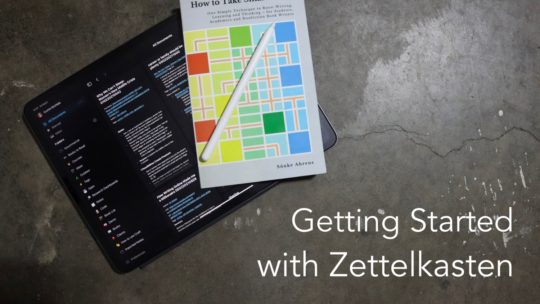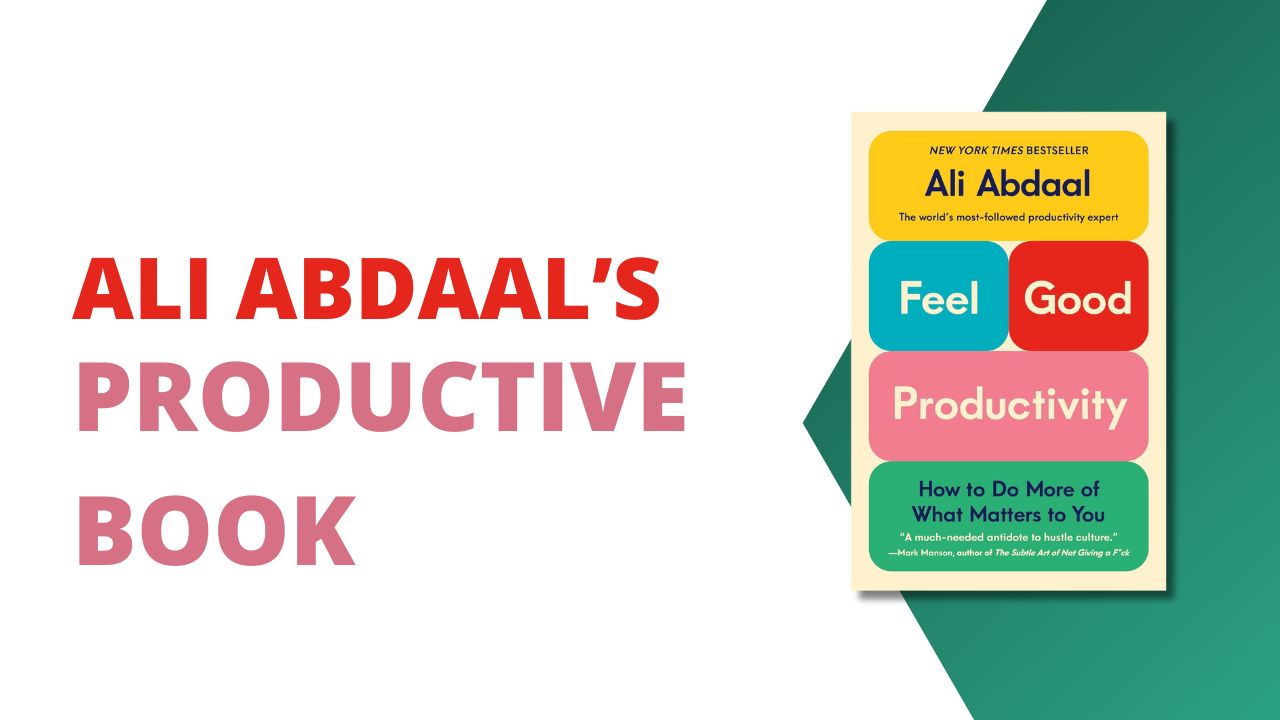Ali Abdaal is a popular YouTube content creator that focuses on productivity and living a good life and his first book is all about helping you be productive without simply grinding harder. Instead Abdaal wants to help readers get stuff done while still taking care of ourselves1. He bases much of his thoughts on the Broaden-and-Build theory by Barbara Fredrickson and positive psychology.
In this theory broaden refers to the idea that when we feel good emotions our minds “open up” and we take in more information, are more creative, and are more inclusive in our thinking2. Secondly, as we broaden our experience we build resources that we can draw on in the future for our benefit3. Here think about having a good time with someone that becomes a friend because of the shared positive experience. You now how a friend to draw on in the future if things are not going as well.
If you want to see my full notes on this book, and many others, become a member
From here Abdaal breaks his book up into the standard 3 sections we see in most productivity/self-help books. First he tackles how to use the science of feel-good productivity to energize yourself. Second he shows you how to use it to overcome procrastination. Finally he uses feel good productivity to show us how we can be sustained long-term by the practice4.
Part 1 – Energize
In Part 1 Abdaal encourages us to take on tasks that energize us, that are fun. He cites Richard Feynman who made many of his break throughs once he started “playing” with physics5. When we find something fun we are more likely to enter flow state6, and when we enter flow state work becomes effortless as the time flies away.
One key idea that Abdaal continues to come back to is that having autonomy7 over our work is a key factor in the work feeling effortless. Think of a prescribed reading syllabus versus a list of books you find interesting, which one will you get through faster?
A final key factor I’ll highlight is the protege effect8. The protege effect shows that when you teach something you know you get to know it better as you do the teaching. This alone is a good reason to share parts of the notes you take and the ideas you get from the books you read. The act of attempting to share your ideas refines them into something better, and you feel some mastery over the content as you deepen your understanding through more research.
Part 2 – Unblock
In the second section Abdaal works to show us how to unblock ourselves, to reduce procrastination. He highlights the key idea that we often procrastinate because we don’t know what the next action is9, which is a key blocker that the Getting Things Done method attempts to alleviate by always getting people to list the next action in a project.
Abdaal also highlights the usefulness of time blocking (I have a course on that) and gives you a decent framework to get started with setting time blocks for different projects.

Getting Started with Zettelkasten
If you’ve been wondering about what Zettelkasten is and how to start organizing your notes with this excellent system then this course is for you. I’ll walk you through how I use this system to develop my reading research for posts like this one here. You can also become a member to get all my courses.
$99 USD (30-day guarantee)
There is also a good amount of influence from the book Atomic Habits in the advice given here. Ideas like, making sure your running clothes are out and available in the morning so you don’t have to get them out before a run. Having your tools ready means you reduce the friction to get started, and it’s much harder to get started than it is to continue with a task10.
Part 3 – Sustain
The final section in the book deals a lot with burnout, or how to sustain your productive practice over the long-term. Abdaal says that burnout can happen to anyone, and not just because you have lots to do. If your job stops feeling meaningful, or you stop seeing progress, burnout is possible11.
To help combat this feeling of overwork Abdaal suggests a few tactics. First he takes the idea of HELL YES or no from Derek Sivers as a way to filter that which you agree to do12. You apply this model to opportunities you have. If the opportunities isn’t a “hell yes I’d love to do that” then it’s a NO. This can help you reduce the responsibilities you take on, especially the ones you take on simply because you think you should, not because you want to take them on.
Second Abdaal introduces us to his CALM methodology to taking breaks13. Don’t doom scroll on social media, or endlessly search Netflix for something to watch. Instead do a task that builds your Competency, as you gain new skills. Take on something that you have Autonomy over and that gives you Liberty, because it takes enough focus that you can’t think about other things in life. Finally, choose something that is Mellow, no high stakes endeavour, or turning your hobby of building furniture into a side-hustle on YouTube.
Finally Abdaal gives us permission to simply write off a day14. Sometimes you need to step back and do nothing because you need a break. This is a hard idea to get across due to the strong Protestant Work Ethic of Western culture. Even though many of us are not religious people, we still fall into the old idea that working is akin to godliness and thus good. If you’re being productive you’re doing something worthy, if you’re taking leisure time, you’re doing something bad.
Issues with Feel- Good Productivity
The first, and biggest issue with Feel-Good Productivity is that it’s based on positive psychology. If we look at Manufacturing Happy Citizens we see that there is a strong replication crisis in positive psychology research. Cabanas and Illouz claim that despite 20 years and 64k studies on the subject, there are only weak ties found and many of the studies contradict each other15. This means that the research Abdaal is basing his system on may be on vary shaky footing when it comes to its scientific repeatability.
Much of positive psychology is tied up in the “guru” fields as well16, where your chosen positive psychology personality says that you need to follow their 6 step plan to be happy and productive. If it doesn’t work for you then it’s because you didn’t follow the plan hard enough, but they do have another course you can take17. These gurus commonly talk in vague language that attributes all failing to you, and any success to the plan they provided. In many ways, they’re little better than con-men. In fact, sometimes that’s all they are, grifters latching on to the current thing they can get money grifting.
A final detrimental area that positive psychology enforces is the capitalist idea that you made a choice to get the things you have18. This idea entirely discounts the fact that economic circumstances and scarcity of resources plays a massive role in the outcomes for the lives of people19. Putting the entire end result on you removes any need for society to take responsibility in the world that has been built which limits the class mobility of most people in society. It negates the responsibility of governments to deal with billionaires hoarding resources while others starve, because if you’re personal choices led you to the life of poverty you have, then it’s your fault and society can absolve itself of responsibility.
This idea that you deserve what you have because of your choices also enables those with wealth to feel fine about keeping it while others starve. See they deserve what they have due to their choices, so they shouldn’t need to feel bad that others made different choices.
One other big hole in the ideas of Abdaal is the need for autonomy in your work. While Abdaal acknowledges that many don’t have autonomy20 over their time and work, he doesn’t go much deeper than a few paragraphs mentioning that family and bosses make control more of your time. The economic circumstances you’re born into have a huge effect on how much autonomy you have with your life and I would have loved to see him go deeper into how to deal with a lack of autonomy.
Unfortunately the answer to that is really a massive change in the economic model that we operate under in Western society, so I wouldn’t expect a full extra book on how to do that, but a bit more acknowledgement would have been nice.
Should You Read Feel-Good Productivity by Ali Abdaal
Yes I feel that Abdaal’s reliance on positive psychology puts his overall idea on shaky footing due to the lack of replicable results, but there isn’t any bad advice here. No I don’t think that Abdaal brought new ground-breaking ideas to the table. I’ve read many books on productivity and self-help and I’ve heard most of the ideas before.
What Abdaal brings to the table is his style of getting the ideas across. If you’ve watched his videos and like what he has to say, then you’ll probably like this book. If this is your first time reading a productivity/self-help book, you’ll likely get a bunch of good ideas out of it to help you live a more productive fulfilled life.
Go ahead and read it, at worst it won’t hurt and at best it will help you focus on the things you want to focus on.
Purchase Feel-Good Productivity on Amazon
See my notes on Feel-Good Productivity
Footnotes
- Pg 4 ↩︎
- Pg 7 ↩︎
- Pg 7 ↩︎
- Pg 15 ↩︎
- Pg 22 ↩︎
- Read Flow for more: https://amzn.to/3wnJnY0 ↩︎
- Pg 57, 70 ↩︎
- Pg 67 ↩︎
- Pg 111 ↩︎
- Pg 160 ↩︎
- Pg 185 ↩︎
- Pg 190 ↩︎
- Pg 210 ↩︎
- Pg 224 ↩︎
- Manufacturing Happy Citizens Pg 29 ↩︎
- Manufacturing Happy Citizens Pg 10 ↩︎
- This also matches up with Conspirituality: https://curtismchale.ca/book/conspirituality/ ↩︎
- Manufacturing Happy Citizens Pg 46 ↩︎
- See Scarcity for more: https://curtismchale.ca/book/scarcity/ ↩︎
- Pg 107, 127 ↩︎
